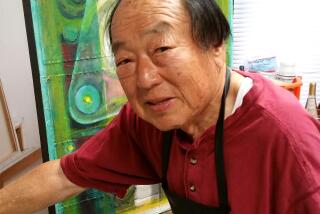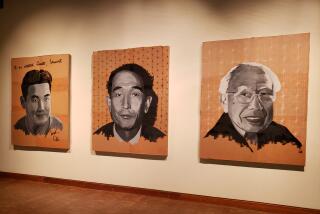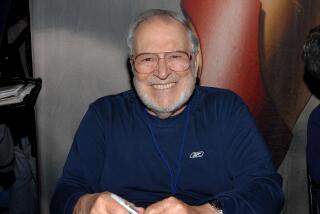Akio Morita, Co-Founder of Sony, Dies at 78
- Share via
TOKYO — Akio Morita, the son of a sake brewer who built Sony Corp. into one of the most powerful brand names in the world, died today of pneumonia at a Tokyo hospital, the company said. He was 78.
Morita co-founded Sony with former Japanese navy colleague Masaru Ibuka in a bombed-out department store in 1946, borrowing $500 to start a radio repair business.
He was the guiding force behind Sony, the first Japanese company to build a manufacturing plant in the United States. Even today, many Americans think of Sony as an American-based rather than Japanese-based company, with products ranging from Walkmans to televisions to motion pictures.
Norio Ohga, who was appointed Sony chairman as Morita’s successor, said today: “My shock at the loss of Akio Morita is beyond description. . . . With his boundless curiosity and brilliant foresight, he was a constant source of inspiration to us all.”
The silver-haired, talkative Morita, who took up water-skiing in his 60s, was also active in trade issues and was highly critical of what he considered to be the shortsighted views of U.S. companies, whose managers and stockholders he said were driven more by quarterly profits and annual dividends than by creativity, investment and innovation.
He co-authored a controversial 1989 book with conservative Shintaro Ishihara, who is now mayor of Tokyo, called “The Japan That Can Say No.” Then Morita refused to allow it to be translated into English.
In a 1986 tour promoting another book he wrote, “Made in Japan,” he said in an interview with The Times: “I’m always criticizing American management rather than the American work force. The American work force is very good. They can produce a good product. They have high morale, and they work hard.
“You Americans should give more incentive to management to run corporations with much longer viewpoints instead of short-term profit. Give management more security to run companies. At the same time, you should discourage management from taking profit away.”
Also in that book, Morita said his company was renamed Sony, derived from the Latin sonus (sound) so it could be recognized and pronounced the same in any language. The firm’s original name was Tokyo Tsushin Denki.
Sony had a great deal to do with transforming the image of Japanese products in America from shoddy to state of the art, with its reputation for innovation and quality.
Sony’s first Japanese manufacturing plant in the United States was a television production facility in San Diego, opened in 1972. Twelve years earlier, Sony had established a New York office for U.S. operations.
Sony made the world’s first all-transistor television in 1960 and the first home videotape recorder in 1965. But Sony’s videocassette recorder, the Betamax, lost a marketing war to the VHS standard ubiquitous in the U.S.
In 1989, Morita led Sony in making a $3.4-billion-plus, sizable-debt purchase of Columbia Pictures, an ambitious, controversial move that came one year after Sony bought CBS Records, another entertainment giant.
Morita has been ailing since 1993, when he suffered a stroke after playing tennis. He retired officially the following year, although he had relinquished the presidency and daily operations of Sony in 1989.
He reportedly declined an offer to become foreign minister in August 1993.
Morita held honorary law degrees from the University of Pennsylvania and Williams College in the United States. He was given France’s Legion of Honor and was knighted by Britain’s Queen Elizabeth II.
Morita is survived by his wife, Yoshiko, two sons and a daughter. Funeral arrangements were pending.
More to Read
Inside the business of entertainment
The Wide Shot brings you news, analysis and insights on everything from streaming wars to production — and what it all means for the future.
You may occasionally receive promotional content from the Los Angeles Times.










